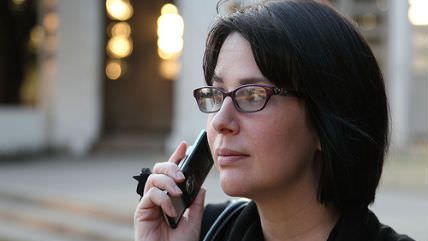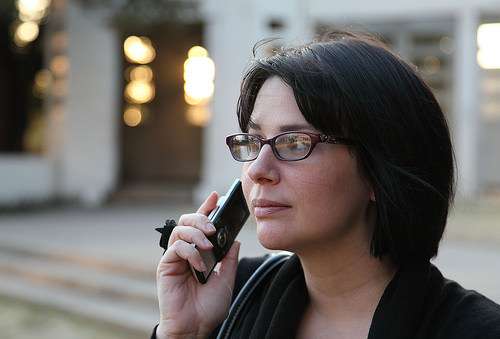Police Use "Tower Dumps" To Collect Cell Phone Data Without A Warrant

Police officers in Richland County, South Carolina are currently defending the use of a controversial investigation method that grants their departments access to thousands of cell phone users' data in the search for criminals.
The technique, in which law enforcement officials rely on what are known as "tower dumps," is an increasingly common policing tactic in local departments across the country. Following a crime, law enforcement officials locate nearby cell towers and request all of the call, text, and data transmissions that occurred during the crime from the tower's provider. The majority of the data collected belongs to individuals with no connection to the crime.

Subjecting yourself to data seizure through tower dumps is easy. Most cell phone activity connects you to a tower in a way that police can collect: making phone calls, texting, and using social media, such as Tweeting or logging into Facebook.
"So for example if you have a smart phone and you're checking your email, that would cause some communication between your cell phone and one or more cell towers," Christopher Sogohian, a principal technologist for the ACLU, told WLTX. "The police can then go back to the phone company and ask for identifying information."
Unlike many forms of data seizure, tower dumps can be executed without a warrant. In accordance with a provision of the Electronic Communications Privacy Act of 1986, law enforcement can, and often does, rely on judge-issued court orders to obtain cell-site data. Such orders don't need to meet a probable cause requirement and so are based on significantly less evidence than is required for a warrant.
According to Brian Owsley, a former judge and current law professor at Texas Tech University of Law, police can use tower dumps to collect considerably more personal information than just phone numbers and locations. In his journal article on the problems with tower dumps, he says:
Subscriber or customer information also available based on a law enforcement request may include the person's name; address; telephone call records, including times and durations; lengths and types of services; subscriber number or identity; means and source of payment, including bank account number or credit card number; date of birth; social security number; and driver's license number. Indeed, any of this information is available simply by presenting the telecommunications provider with a subpoena.
Additionally, police departments are not required to notify people when their data has been seized and can hold on to the information for long periods of time. In South Carolina, for instance, evidence control laws say that if a suspect is convicted or pleads guilty, police can keep everything they pull from a tower dump for up to seven years.
Civil libertarians have been questioning the constitutional legitimacy of tower dumps since news reports started revealing the prominence of the practice.
"To turn everybody's telephone data to the police unrelated to any suspicion of crime, I think it's an unreasonable search and seizure," said Jay Bender, a First Amendment attorney who represents WLTX. "I don't think that's permitted by the Constitution."
After the New York Times published a shocking breakdown last year on the numbers of cell phone data requests law enforcement was submitting to cell providers, the ACLU responded with a condemnation of the practice.
Despite some government officials, like the California District Attorneys Association, describing tower dumps as "a search warrant of last resort," the practice is widespread and growing.
In 2011, AT&T and Verizon received 1.3 million requests for cell phone data (many of which were tower dumps) and filled more than 500,000 of them. Verizon estimates that over the last 5 years, law enforcement's tower dump requests have increased by 15% annually. T-Mobile reported increases of approximately 12%-16%.
Editor's Note: As of February 29, 2024, commenting privileges on reason.com posts are limited to Reason Plus subscribers. Past commenters are grandfathered in for a temporary period. Subscribe here to preserve your ability to comment. Your Reason Plus subscription also gives you an ad-free version of reason.com, along with full access to the digital edition and archives of Reason magazine. We request that comments be civil and on-topic. We do not moderate or assume any responsibility for comments, which are owned by the readers who post them. Comments do not represent the views of reason.com or Reason Foundation. We reserve the right to delete any comment and ban commenters for any reason at any time. Comments may only be edited within 5 minutes of posting. Report abuses.
Please to post comments


I think it's an unreasonable search and seizure," said Jay Bender, a First Amendment attorney who represents WLTX. "I don't think that's permitted by the Constitution.
He must not have the magic glasses that let him read the "Fuck You, That's Why" clause written in special ink.
It's safe to say that there's a penumbra of "Fuck You, that's why" at this point.
Following a crime, law enforcement officials locate nearby cell towers and request all of the call, text, and data transmissions that occurred during the crime from the tower's provider.
Because today's criminals probably can't do their dirty deeds without using their fucking cellphones?
Why not just check every transmission anywhere near the crime to find out whether any person of interest was communicating suspiciously?
Why not just check every transmission anywhere near the crime to find out whether any person of interest was communicating suspiciously?
Why not just take the first digit of the phone numbers that received every phone call ever made, print them out in single spaced 10 point Times New Roman font on 8.5*11 inch paper with one inch margins, wad up those papers very tightly, and shove them up the ass of every police officer? It might give them magical crime stopping powers.
If that could possibly help stop just one crime, aren't we obligated to try it?
Towers log where your phone is, even if you aren't using it. So these dumps contain not only data on what phones were being used, but on what phones were in proximity to the tower. So if you plan on committing a crime, leave your cell phone somewhere else. Then you've got an alibi. "Check the cell tower records! My phone, and me with it, were no where near the crime!"
"Incontrovertible evidence, Your Honor."
Apparently there was no crime prior to the invention of the cellphone.
Following a crime, law enforcement officials locate nearby cell towers and request all of the call, text, and data transmissions that occurred during the crime from the tower's provider.
I'm sure their demands for data are tightly focussed on a very narrow time frame.
The few people I knew who were paranoid enough about this stuff to care directly about it (I care broadly, but really my data isn't showing anything to them... at least I don't think - that is until it shows me going to libertarian meetings or whatever) - removed their batteries when talking about stuff which might be construed as problematic by others.
With that - I would think any average-intel criminal whose crime requires them to be somewhere (assault, burglary, bank robbery, etc) in person, aren't likely stupid enough to use their phone, leave it on, take it with them, etc, etc, etc. Most use burners of course.
Which begs the question - what they hell are they looking for?
Control is the answer.
Irregardless - if you care - you can simply shut of your GPS. You really only need it for maps and, if you care, when you search for things you need GPS for local results. Both of which uses most people need rarely throughout the normal day (assuming they cannot turn it on without your knowledge).
Better still - I would assume now, or shortly after this - someone will build a jailbroken app to check and limit data sent to tower.
So in the end - the data they'll get will be of innocent people who either don't care to do anything about this or don't know enough to do anything to prevent government spying - and most criminals are likely smart enough to mitigate this themselves already.
So again - what the hell are the trying to do?
Or question for MI politicians - has this data ever been used to successfully catch an unknown perp/prosecute anyone?
If not - then not only are they violating what I think are our privacy rights - but my guess is they are not getting enough useful information to make the number of times it has been used successfully as an investigate/prosecutorial tool high enough to justify even the costs of getting and analyzing the data automatically.
Though like NY - I guess they could refuse to answer any questions along those lines.
But I keep coming back to the same question - then what the hell do they gain from this?
You must be constantly surveilled because you have committed a crime and it is the duty of the police to figure out which one. Technology helps them perform that duty.
If reason is going to persist in calling it "your data" when it clearly doesn't belong to "you", then I'm disinclined to care. Present the issue honestly, please.
If you like your opinion, you can keep it. Period.
English is an imprecise natural language and the grammatical possessive can have other meanings besides "is owned/possessed by", such as "about or concerning" or "originating from".
It should be illegal to collect cell tower data for anyone without a warrant. That wouldn't stop them from doing it, of course, but it would make them have to go through the extra step, when the practice is exposed, of having to clear themselves of any wrong-doing.
Good SCOTUS case, right? As didn't they recently decide that placing a GPS tracker on one's car is intrusive and must be accompanied with a warrant?
IIRC - then I would think this case would be "worse" as it's tracking the individual all day every day. Seems more onerous...
So under the same logic, if someone gets mugged, the police can round up everyone in a six-block radius and search them? Somethin-somethin security in their persons, papers somethin'.
That somebody may be driving drunk is already considered sufficient cause to stop everybody on a particular road during a particular interval of time, so...
The Aurora, CO cops seemed to think so. FTL: